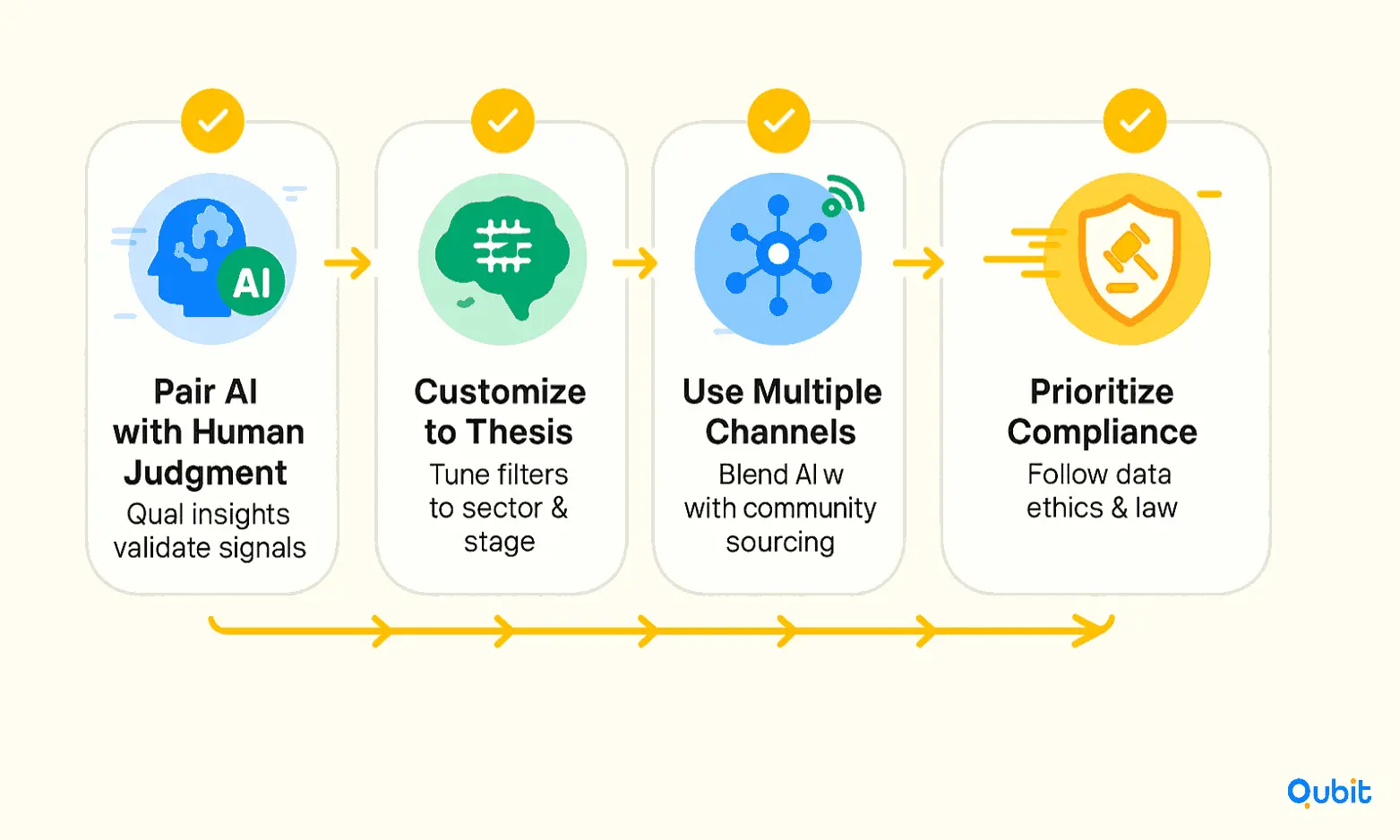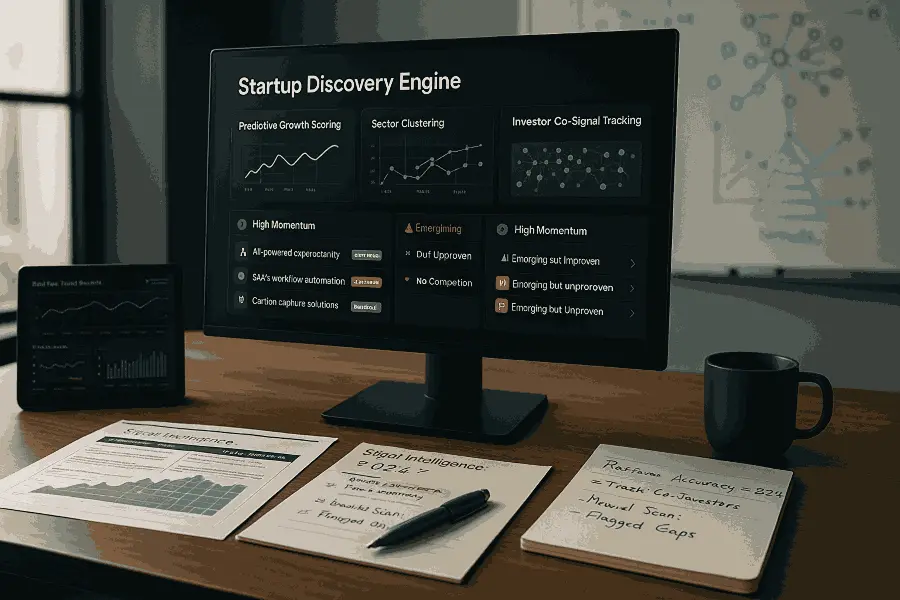AI and data platforms are quietly changing how you source deals, qualify founders, and spot breakout startups ahead of the broader market. Instead of relying only on warm introductions, conference chatter, and fragmented CRM notes, investors are turning to tools that surface signal rich patterns in real time. These platforms scan hiring spikes, product launches, web traffic, user traction, and capital flows to highlight startups that fit your thesis before they hit everyone’s radar.
For you as an investor, the edge now lies in how you combine judgment with these new discovery engines, not in access alone. Used well, AI and data platforms can sharpen sector theses, reveal under the radar founders, and cut time wasted on low conviction outreach.
This blog will explore actionable methodologies, tools, and case studies to help investors uncover high-growth opportunities.
Let’s jump right in!
Why AI & Data Platforms Dominate Startup Discovery
The startup ecosystem grows more competitive and data-driven each year. Investors can no longer rely on gut instinct, serendipitous meetings, or an inner circle of referrals alone. Recent market data highlights this competitive surge. In 2024, global startup funding reached $314 billion, rising by 3% over 2023. This reflects steady expansion and underscores the necessity for advanced discovery strategies. Using robust data platforms becomes essential as investor activity intensifies.
Data platforms and AI help investors discover high-growth startups efficiently by centralizing insights, enabling rapid filtering, and offering predictive analytics.
- Explosion of Early-Stage Ventures: Tens of thousands of new startups emerge annually, spanning every geography and vertical.
- Fragmented Digital Footprint: Key signals are spread across news, databases, social channels, job boards, and private dealrooms.
- Speed and Scale: Winning investors identify and meet startups earlier in their journey—often before public news or major funding rounds.
- Quantitative Edge: AI- and data-powered research enables pattern recognition, opportunity scoring, and automated filtering at scale, far faster than any human team.
Sophisticated investors use data platforms and AI engines to:
AI’s impact on venture activity is unmistakable. In 2024, AI captured 37% of startup funding and 17% of total deals—setting all-time highs for the sector. This quantifiable surge demonstrates the importance of integrating AI-driven methods.
- Scan deal flow and filter by sector, business model, team experience, growth rate, and signal strength.
- Predict outlier growth based on alternative datasets (e.g., hiring velocity, product adoption, digital traction).
- Benchmark startups against global and industry peers, not just local competitors.
- Eliminate manual bias by relying on objective indicators surfaced via machine learning.
With the fundamentals established, let’s examine the landscape of leading AI and data platforms that drive startup discovery today.
Data-Driven Scouting: Combining Algorithms and Human Expertise
AI identifies prime startups, but human analysis remains crucial for team assessment and market fit.
Generative AI: Streamlining Communication and Evaluation
Generative AI tools have revolutionized the evaluation process. These technologies simplify communication with founders, automate repetitive tasks, and provide detailed insights into startup viability.
Identifying Market Gaps
A practical approach to identifying innovative startups is presented alongside detailed methods featured in the discussion on competitive analysis investors. This strategy connects data-driven insights with pinpointing unmet market needs, enabling investors to discover startups that address critical gaps.
By integrating technology, qualitative assessments, and generative AI tools, startup scouting becomes a streamlined and effective process, empowering investors to make informed decisions and stay ahead in competitive markets.
Top AI & Data Platforms Used by Investors
AI & Data Platforms now dominate early-stage scouting, offering unique strengths and use cases for investors. Here are top data platforms you can use:
1. PitchBook
PitchBook combines an industry-leading database of private market transactions with AI-powered analytics to help investors scout for high-potential companies and tailor deal targeting. Its features include:
- Deal Intelligence: In-depth coverage of funding rounds, valuations, and investment activity by sector, geography, and round type.
- Investor Matching: AI algorithms surface investors aligned with specific thesis, deal stage, and past behavior.
- Market Analytics: Predicts industry trends and competition metrics using historical investment data.
- Custom Alerts: Instant notifications for new rounds, traction signals, or sector-specific movement.
For example, an investor wanting to focus on healthtech startups in Northern Europe raising Series B rounds can filter for this niche and receive custom reports, identify patterns, and reach out before competing VCs react.
2. Crunchbase
Crunchbase is a universally recognized platform providing startup profiles, funding rounds, industry classification, and founder data. Standout features for investors:
- Comprehensive Company Database: Track startups globally, across all sectors and funding stages.
- AI-Powered Alerts: Receive notifications for new funding, trending companies, and active investors.
- Integration: Allows CRM/public API connection for workflow automation.
- Market Insights: Curated news, estimated revenue, and competitor tracking.
Crunchbase is popular with both institutional investors and solo angels, affordable, easy to integrate, and strong on breadth.
3. Harmonic.ai
A newer entrant specifically designed for discovery of high-growth, early-stage startups:
- Machine Learning Discovery: Cross-references millions of companies and surfaces hidden high-potential ones, even in stealth.
- Powerful Filters: Search by business model, funding signals, founder background, team growth, and more.
- AI Scout: An automated agent that finds startups matching custom investor criteria and continuously scans for new entrants.
Harmonic.ai excels for seed/Series A investors who must move early, identifying companies with strong founder credentials or viral hiring surges before news breaks.
4. Tracxn
Tracxn is a market intelligence and private startup database platform, prized for its:
- Quarterly Sector Reports: 1,000+ industry/vertical updates covering emerging trends.
- Startup Ratings & Leaderboards: Proprietary “Soonicorn” ratings (startups considered 'soon-to-be unicorns') highlight likely unicorns.
- Idea Hubs: Cluster startups around themes (e.g., generative AI, deeptech, climate) for focused research.
This is ideal for funds wanting to track not just individual companies but competitive sector landscapes, with extensive data visualization tools.
5. VentureRadar
VentureRadar discovers and ranks new startups via web scraping and algorithms that parse millions of digital signals:
- Discovery Lists & Rankings: Surfaced regularly, using proprietary scoring.
- Email Alerts/Export: Easy integration into pipeline management tools.
- Free & Paid Tiers: Good for both pipeline building and general market scanning.
While it lacks the deep analytics or CRM features of others, it’s favored for raw discovery and out-of-the-mainstream finds.
6. Dealroom.co
Dealroom integrates tech ecosystem mapping, predictive analytics, and high-frequency deal tracking:
- Predictive Intelligence: AI models estimate future unicorns, market movers, and trends.
- Data Export & Custom Views: Supports deep-dive analysis and pipeline management.
Its European roots but global reach make it a staple for top VC firms and corporate scouts expanding into new geographies.
Strategic Considerations, Best Practices, and Challenges
Effective startup scouting demands a blend of strategic foresight, best practices, and an awareness of potential challenges. From accessing global innovation to managing data overload, the process requires a nuanced approach to ensure optimal outcomes.
Strategic Factors Shaping Startup Scouting
Global innovation access and cost efficiency are pivotal in identifying promising startups. Platforms that integrate AI-powered startup scouting streamline this process by analyzing vast datasets to predict success signals. For example, machine learning systems can sift through founder communications and market trends to uncover hidden opportunities.
However, balancing automation with human insight remains critical. While algorithms excel at processing large datasets, they may overlook early-stage disruptive innovators. Edge cases include AI missing contextual factors, biased data sets skewing results, or privacy limitations restricting useful data.
Long-term success is a rare outcome in the startup ecosystem. Only 34% of businesses survive beyond a decade. This stresses the need for rigorous validation and strategic planning in scouting.
Best Practices for Optimizing Scouting
Adopt Hybrid Scouting Models
Combining algorithmic precision with expert judgment creates a holistic framework for evaluating startups. This approach filters large volumes of incoming signals effectively while retaining the nuanced understanding that only human expertise can provide.Implement Real-Time Monitoring
Continuous data feeds enable instant updates on emerging players and pivoting founders. By utilizing real-time startup monitoring, organizations can stay ahead of the curve and respond swiftly to market changes.Use Contextual Search via Large Language Models (LLMs, a type of AI trained on large amounts of text)
LLMs review founder communications and press releases to uncover strategies. This improves the alignment of scouting with hot sectors and offers better insights.Integrate with Innovation Ecosystems
Building collaborative links with R&D hubs and accelerators grants access to under-the-radar opportunities. This integration fosters synergy and cross-pollination, expanding the scope of scouting efforts.
For a deeper understanding of dynamic investment signals, consider exploring how to track startup funding news. This resource highlights the value of real-time funding alerts in refining strategic scouting efforts.
How AI Enhances Startup Discovery: Capabilities and Applications
Artificial intelligence significantly extends the capabilities of traditional data platforms, enabling investors to uncover high-growth startups with precision and speed. Let’s unpack some ways AI is transforming startup discovery:
AI’s impact is especially pronounced in the earliest stages. In 2024, 55% of pre-seed startups fell under the AI category and attracted 75% of all capital raised at this level. This signals the sector’s dominant influence in shaping early-stage investment.
1. Pattern Recognition Across Massive Datasets
AI systems analyze historical and real-time startup data, including funding rounds, team bios, product launches, hiring patterns, social media traction, patent filings, and press mentions, to identify patterns often missed by human analysis. For example:
- Hiring Velocity: Sudden spikes in engineering hires might signal product development acceleration.
- Digital Engagement: Surges in website visits or app downloads can forecast revenue growth.
- Network Effects: Mapping founder backgrounds or investor syndicates to spot “hot” networks repeatedly producing winners.
These multifaceted signals feed AI models predicting which startups have the highest probability of rapid growth or market disruption.
2. Automated Scoring and Ranking
AI enables investors to assign custom “scores” to startups based on weighted variables derived from their investment criteria. These can include:
- Financial metrics: revenue growth, burn rate.
- Market factors: total addressable market size, competition.
- Team characteristics: prior startup success, domain expertise.
- Technology indicators: patent filings, product launch cadence.
Such scoring helps prioritize deal flow automatically, reducing noise and focusing due diligence efforts where potential is highest.
3. Natural Language Processing (NLP)
NLP techniques parse unstructured data sources, including news articles, social media posts, regulatory filings, and patent documents, transforming qualitative information into quantifiable insights. This allows investors to:
- Detect early announcements or rumors of funding rounds.
- Gauge public sentiment and emerging sector buzz.
- Extract key themes or risk factors from large document volumes.
4. Predictive Analytics and Future Unicorn Identification
Some platforms, like CB Insights and Dealroom, apply machine learning models trained on years of data to forecast startups likely to become market leaders or “unicorns” (private companies valued at over $1 billion). These predictive insights can guide earlier, higher-impact investments.
Integrating AI & Data Platforms into Investor Workflows
Integrating AI & Data Platforms into investor workflows maximizes their value for discovering high-growth startups.
1. Setting Clear Investment Hypothesis and Filters
Define your investment thesis with specific parameters, sector focus, funding stage, geography, technology maturity, and translate these into platform filters or AI model inputs. This reduces random noise and aligns outputs with your strategic goals.
2. Automating Alerts and Daily Scans
Configure platforms for real-time or daily alerts on startups meeting your criteria, with summaries and linkages to key metrics. This keeps you informed without requiring constant manual search.
3. Combining Quantitative AI Scores with Qualitative Judgment
AI & Data Platforms provide quantitative insights that investors should combine with human expertise for best results.
- Choose top-rated platforms
- Set up custom filters
- Schedule daily scans/alerts
- Validate AI discoveries with manual research
- Track and refine criteria
AI-generated rankings and signal flags are starting points. Complement these with human evaluation, engaging founders, assessing product demos, and market research, to validate and deepen insights.
4. Collaboration and Data Sharing
Leverage CRM integrations and collaboration tools to share data insights with your investment team, track feedback, and document due diligence progression in a centralized system.
Platform Integration and Compliance in Investor Workflows
Building on collaboration, seamless integration between AI platforms and existing investor tools is critical for workflow efficiency. Investors should prioritize platforms that support robust data sharing, CRM connectivity, and automation features. Compliance with data privacy regulations such as GDPR and CCPA is equally vital, ensuring responsible handling of sensitive startup information. These factors help investors avoid legal pitfalls and maintain trust with founders and partners.
Continuous Feedback Loops
Regularly review the relevance and quality of AI outputs, adjusting model parameters or data sources to refine future discovery success.
Automating Engagement and Follow-Up
- Configure AI tools to send personalized outreach messages to founders, saving time and increasing engagement rates.
- Automate follow-up sequences to ensure timely communication with promising startups, reducing missed opportunities.
- Track responses and engagement metrics within integrated platforms to refine outreach strategies and improve future results.
These case studies not only validate the effectiveness of AI-driven scouting but also emphasize the importance of identifying disruptive tech startups. For a deeper dive into innovative scouting methods, explore how to identify disruptive tech startups.
From enhancing productivity to forging strategic partnerships, these success stories illustrate the immense potential of AI and data platforms in transforming the startup discovery process.
Best Practices for Using AI & Data Platforms Effectively

Entrepreneur sentiment is on the rise. In 2025, 87% of founders reported improved financial confidence over the previous year. This optimism signals opportunities for investors who integrate AI best practices and combine them with human expertise.
- Combine Quantitative Insights with Human Expertise
AI-generated analytics and startup scores provide a powerful starting point but should not replace human judgment. Use these insights to prioritize startups for deeper review, then engage in qualitative due diligence, founder meetings, product demos, market analysis, to validate and contextualize AI-driven signals. - Customize Models and Filters to Your Investment Thesis
Instead of applying generic AI outputs, tailor platform filters, scoring weightings, and alert criteria to your specific focus areas. For example, if you invest primarily in early-stage SaaS startups in Southeast Asia, adjust parameters accordingly to avoid noise and surface more relevant opportunities. - Diversify Discovery Channels
While AI/data platforms are indispensable, maintaining multiple sourcing channels safeguards access to proprietary deal flow. Complement platform outputs with personal networks, accelerator cohorts, demo days, pitch competitions, and active participation in relevant founder or investor communities. - Continuously Validate AI Outputs
Track the actual outcomes and performance of startups surfaced by AI models. Analyze success rates and false positives to refine your discovery process, adjust filters, reweight variables, switch data sources, to improve predictive accuracy over time. - Prioritize Data Governance and Compliance
With increasing regulation around data privacy (GDPR, CCPA, etc.) and ethical concerns, ensure that your data collection, storage, and use comply with laws and best practices. Vet your AI platform providers for compliance and maintain transparency about how you handle sensitive data.
Conclusion
AI and data platforms are now table stakes in startup discovery—the advantage comes from how you use them, not whether you have them. Investors who wire these tools into their sourcing, screening, and IC process are consistently seeing deals earlier, qualifying founders faster, and spending less time on low-conviction conversations. The goal isn’t to replace your judgment, but to point it at the 5% of startups most likely to matter.
If you’re ready to sharpen your edge, make use of our startup scouting services to systematically surface stronger opportunities before they become obvious to the rest of the market.
Key Takeaways
- AI and data platforms enable early detection of high-growth startups.
- Integrated, data-driven methodologies provide a significant competitive edge.
- Real-world case studies validate the effectiveness of advanced scouting tools.
- Generative AI optimizes startup evaluations for better decision-making.
- Balancing automation with human insight is crucial for successful startup scouting.
Frequently asked Questions
How does AI improve early-stage startup scouting?
AI enables investors to detect startups by analyzing patterns in massive datasets. This leads to earlier discoveries and better identification of high-growth opportunities.






